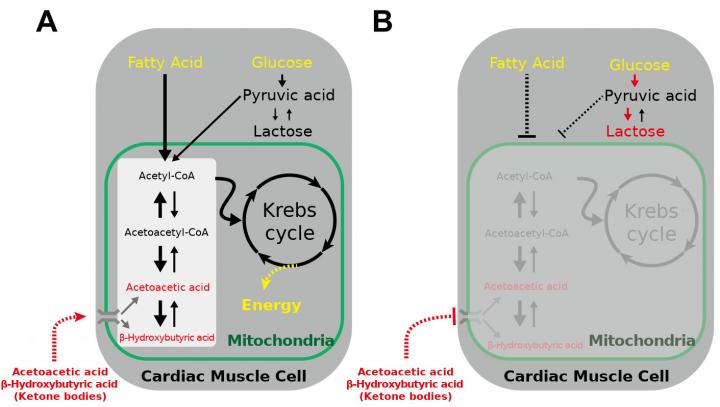
(A) Ketone bodies (acetoacetic acid, β hydroxybutyric acid) are typically decomposed into acetyl CoA in the mitochondria and become energy sources through the citric acid cycle.
Ketone bodies (acetoacetic acid, beta-hydroxybutyric acid) are metabolites that can be used as energy sources like glucose and fatty acids. They can be converted into acetyl-CoA, which produces energy via the Krebs cycle in the mitochondria, and are typically used as an alternative energy source during starvation, fasting, or periods of high-intensity exercise. However, their utilization rate in the heart and effect on disease conditions was poorly understood.
In a new study by researchers from Kumamoto University, Japan, blood samples were collected from cardiac catheterization patients at the entrance (aortic root) and exit (coronary sinus) of the vascular network that supplies blood to the heart (coronary circulation). The samples were then analyzed to determine the amount of ketone bodies in the heart
Researchers found that about 35% of the ketone bodies were consumed during coronary circulation under normal conditions. They also discovered that the utilization of ketone bodies decreases substantially when coronary circulation is reduced (myocardial ischemia). In myocardial ischemia, anaerobic metabolism is accelerated, lactic acid production is increased, and mitochondrial function requiring oxygen is impaired. When the mitochondrial function is impaired, ketone bodies cannot be used. This dynamic change occurs in just a few minutes, and the research shows that the heart is constantly moving and rapidly switching energy sources.
Dr. Yuichiro Arima of Kumamoto University, leader of this study commented, “Based on what we have seen here, we expect to see advancements in research on efficient energy use in the heart and perhaps the development of new treatment methods for heart disease.”
###
This research was posted online in the “Journal of the American College of Cardiology” on the 5th of November 2018 and will be published in the journal on the 14st of January 2019.
[Source]
Arima, Y. et al., 2018. Myocardial Ischemia Suppresses Ketone Body Utilization. Journal of the American College of Cardiology. Available at: http://dx.
Media Contact
J. Sanderson & N. Fukuda
[email protected]
Related Journal Article
http://dx.




